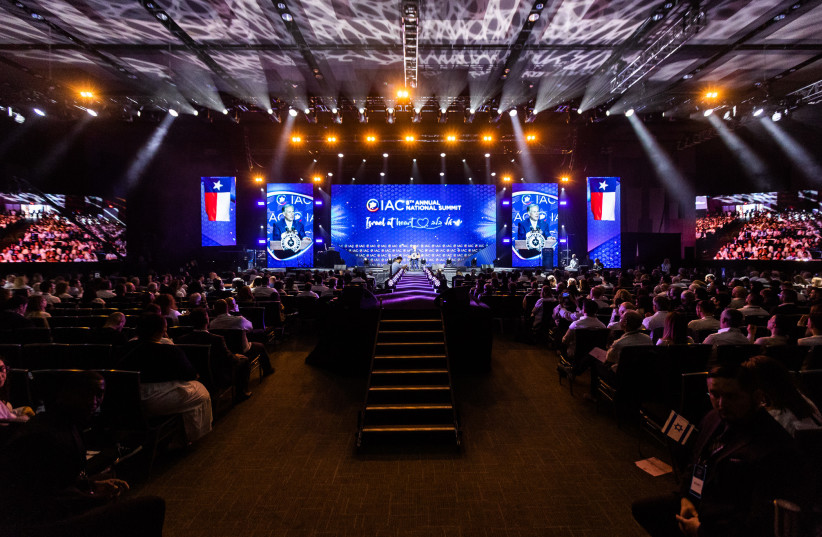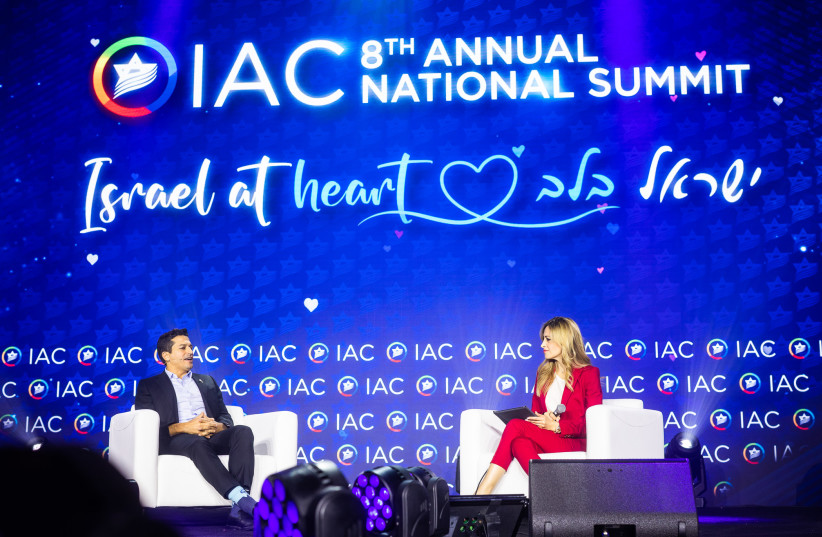AUSTIN, TEXAS The situation felt surreal: An Israeli minister, an Israeli consul general, an Israeli-American billionaire, heads of top international tech companies, educational figures and media personalities all sat around one Shabbat table in Austin, Texas.
They were surrounded by hundreds of college students and young professionals from across the US, mainly children of Israeli ex-pats, but also American Jews who love Israel. They danced and sang for hours, with no one asking them to do so - it was completely organic.
The Israeli IDF band was asked to sing a few songs in acapella style since many of the participants are religious and do not use microphones on Shabbat. They sang Jewish and Israeli songs beautifully and intended to get off the stage, but the “adult table,” with all of the VIPs, such as Miriam Peretz, mega philanthropist Dr. Miriam Adelson and Diaspora Affairs Minister Amichai Chikli wouldn’t let them end.
They continued singing and the younger participants stood on their chairs and danced while singing and clapping. Nobody in the room could be removed from the energy and excitement, from the Jewish spirituality and connectedness. The political opinions of the members of this non-homogenous group were diverse; But they all shared the love for Israel - even though terrible Kosher food was served and many were hungry.
While in Israel, the discourse has become toxic and extremes are probably louder and more influential than ever - there was a sort of harmony in Austin.
“I now understand how unique Jewish life outside of Israel is,” Chikli said later. “I wish we would be able to have true and deep discussion as we had here in Austin, with all types of Jews, in Israel, but unfortunately it is more difficult in Israel.”
The annual IAC conference is a unique opportunity for a glimpse into the growing group of new American Jews, who call themselves “Israeli Americans.” There are about one-million Israeli Americans, if you also consider their children and grandchildren, who live across North America.
One of the highest-profile and most impactful events in the Jewish world, the summit bridges the US and Israel through a shared experience of the Israeli spirit and gathers multiple generations of families with the theme “Israel, Together.”

Nearly 3,000 Israeli Americans, American Jews and Israelis gathered for the 2023 summit, the largest pro-Israel Jewish conference of the year. This year’s summit also inaugurated the Israel America Business Playground, featuring Israeli and American fintech, health tech, climate and sustainability, real estate, venture capital, and workforce leaders, who are presenting their business models and strategies to strengthen commerce and innovation between the two countries.
The evolution the IAC has gone through is overwhelming. From a small and local community organization in Los Angeles they are now in tens of cities across the US and are considered the fastest-growing Jewish organization in America.
During their first annual conference, then in Washington DC, there were barely enough participants for a minyan in prayer services that took place in the small Chabad house, across the street from the hotel where the conference took place. Most of the participants in the prayer service were the speakers who arrived from Israel, not local participants.
This weekend, there were hundreds of people who participated in the prayer services, most of them Israelis living in the US. There were also other options than just Orthodox services, such as egalitarian, musical and Sephardic.
There were sessions without microphones in order to respect those who observe Shabbat as well as regular sessions. There was a special Shabbat elevator service and musical Kiddush and Havdalah ceremonies.
The IAC becomes more and more a “Jewish” organization as the years go on - as an organization that began as a secular one, that wasn’t interested in any outside religious influences. The IAC leadership internally understood that they wouldn't be able to maintain their children’s Israeli identity without also basing it on Judaism.
One thing that has become more evident throughout the years, is that the IAC is way more than an annual conference, it's a movement or rather a community. They’ve developed their own inner language and jargon. “Israeliness” is what they feel defines them and they have many titles for the age group or type of activity they are part of.
This conference is also very different from any other Jewish-American conference, mainly because there are participants at all ages. Many of the large conferences for Jewish organizations are participated by a very old demographic or of youth movements and organizations - but not a combination as we have seen at the IAC.
While their parents participated in lectures or panels delivered by Israeli business leaders or leaders, the children met with Israeli pop sensations and learned about Israeli astronauts in space. The older children met with Israeli social media stars and heard how they can represent Israel online. Entire families attend this summit yearly and the community has slowly been created.
There were many elephants in the room: The political situation in Israel and the different planned reforms as well as the built-in tension between the Israeli-American and Jewish-American communities.

"We need you to sit at these tables in the American Jewish community, in organizations such as Jewish Federation's and JCCs; To participate in American Jewish life. We need you to share the challenges that we [all] have for our children, and our goal to keep them connected,” Wilf said and received a big round of applause. “The bottom line is: We need you. We need you to be the ambassadors in this country to say I stand up for Israel, I stand up for Israel's values.”
IAC CEO and one of its founders, Shoham Nicolet, said in his speech that “this summit is the culmination of a yearlong effort in over 100 communities and campuses across the nation.”
Chikli was the only Israeli politician who participated this year. There are a few reasons for this decision; The first was technical, the current Israeli government was established a few weeks ago and it was difficult to have other senior politicians participate. In addition, the IAC was cautious about not getting into heated discussions regarding this current government because they wanted to try and be bipartisan.
“On its 75th birthday, Israel is still searching for the golden path, with the right synergy between a Jewish State and being a beacon of democracy,” Nicolet said. “The relationship between the three branches and a set of other national issues that will determine its future, including issues that might affect us, who live here in America. At times, the temperature of these battles rises.
“From the first day the IAC was born, this month 16 years ago, our clear policy was to respect, trust, support and love Israel with no condition: Its people and its democracy. IAC members come from a very wide spectrum of ideologies and have always been working together as one, beyond politics.”
“It doesn’t mean we all think the same,” Nicolet stressed. “It doesn’t mean that as individuals we always agree with different Israeli governments. This weekend we held sessions to allow this exchange of ideas, touching many of the issues in conflict. Disagreement and debating is a central part of Jewish tradition and Israeli Culture.”
“We should not keep talking about building bridges as if we are two different people with a tunnel between us,” Nicolet added. “We should not put all our focus on gaps while missing out on so many opportunities for growth.”
This was Chikli’s first visit outside of Israel as Diaspora Affairs minister. He spent the three days of the conference running from panel to panel, and was interviewed by journalists and IAC leadership on stage while also spending his time schmoozing with the participants, mainly the younger ones.
Chikli was an admired educator before entering politics, as a charismatic head of one of Israel’s leading leadership academies, for young men and women before their army service. He, therefore, enjoyed listening to as many individuals as possible, whether it was about their business ventures or life as Israelis in the Diaspora.
During the conference, the minister shared that “in order to address the growing crisis of Jewish identity, we must rise to the occasion and invest every effort into building a broad Jewish-Zionist consensus that unites the Jewish-Zionist public in the State of Israel as well as the overwhelming majority of the population and the Jewish-Zionist public in the Israeli communities around the world, with a particular emphasis on the US.”
He explained that “we must not shy away from recognizing the existence of this crisis, for without doing so, we will be unable to effectively address it. This crisis is both deep and complex, for Jewish identity has always demanded sacrifice.”
Before the conference took place, a closed session of round tables took place, in which the participants discussed the Israeli-American community and its connection to the Jewish-American community. The IAC and the Ruderman Family Foundation partnered on this joint initiative aiming to connect the Israeli-American and Jewish-American Communities.
According to the mission statement of this discussion, its mission is “to enhance the prosperity and resilience of the Jewish communities across the US through the newly forged connections between its Israeli-American members and its Jewish-American members.”
It was added that “this new form of leadership and discourse will bring about a deeper, more personal and complex Jewish engagement and understanding between one another, and a stronger connection to Israel.”
Measures of success include “new Israeli-Americans becoming lay leaders within the IAC; new Israeli-Americans becoming community leaders within the IAC ecosystem; new Israeli-American leaders becoming active in Jewish-American institutions and in their respective communities,” and more.
The IAC survey results
The IAC conducted a survey amongst Israeli-Americans in order to better understand their constituents and displayed the results at the round tables. 42% of the Israeli-Americans said that they weren’t intending to live in Israel in the future, as opposed to 38% who said they are probably going to return or definitely going to return. In addition, 95% have family in Israel and 52% visit Israel every year or two.
25% visit Israel several times a year. Politically, 73% vote influenced by the American politician candidate’s inclination towards Israel. In addition, 72% feel connected to the American-Jewish community and 93% consider it important that their children identify as Jews. A large percentage of Israeli-Americans are secular or traditional and therefore, 81% stated that Judaism is first a culture.
The IAC is on the right track towards creating a new type of Jewish community outside of Israel which is different from the communities they came from in Israel and also different from the Jewish communities that they usually feel excluded from in their own cities across the US.
Yet, there is no justification, in many situations, that the Israeli-American activities of the IAC couldn’t take place on existing communal Jewish campuses in America. These two communities can complete each other in so many ways and will both benefit from this connection. Jewish-American leaders, such as Eric Fingerhut who heads the Jewish Federations of North America, have been constantly participating in the IAC summit in the past few years and have been promoting a connection between their organizations and the IAC. This is hoped to become the norm.
